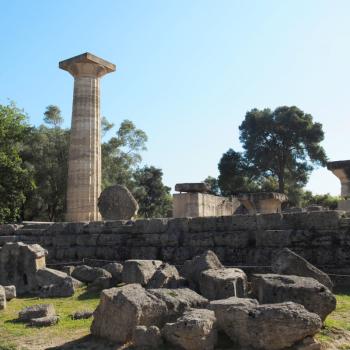Monotheists’ commands to “trust God” are a double-edged sword. On one edge, they promote wishful thinking and a passive acceptance of the status quo that can easily turn into the spiritual opium Karl Marx ranted against.
But the other edge of that sword can be helpful. Whether you are a Stone Age hunter-gatherer, a medieval peasant working the land, or a high-tech city dweller, you are dependent on many people and processes that are out of your control. It can be comforting, even liberating, to “turn it all over” to a Higher Power and trust that things will work out OK one way or another.
This desire for reassurance is, I suspect, one of the main reasons many Pagans’ view of Goddess or even of individual goddesses and gods is simply a kinder, gentler version of the god of the monotheists. That view does not line up with the way our pre-Christian ancestors understood their gods, nor is it compatible with the experiences of most contemporary polytheists. I’m sure you’ve seen the Facebook meme: “Jesus loves you. Odin wants you to grow up.”
The foundation of trust is not blind faith. The foundation of trust is the evidence of past performance. Cathy and I keep all our finances jointly. I trust her to spend wisely and conservatively because from the time we met she exhibited responsible behavior with money. I have friends I would trust with my life but not with my lunch money because they have exhibited very different behaviors.
As polytheists, we can trust our gods, but we cannot trust them to be divine helicopter parents who will make everything nice and pleasant for us. Neither can the monotheists, and to their credit, many recognize this.
 We can trust the gods to be who and what they are: beings of great but limited power and wisdom, with their own personalities and priorities, and their own areas of responsibility and interest.
We can trust the gods to be who and what they are: beings of great but limited power and wisdom, with their own personalities and priorities, and their own areas of responsibility and interest.
Although I have learned and grown and changed over the course of my life, I am still the same basic person today that I was at 21. I may respond to a situation differently now than I would then, but I will not respond in a way that is inconsistent with my core being. Likewise, it is reasonable to expect that our goddesses and gods have learned and grown in the centuries since our ancestors first wrote about them, but it is not reasonable to assume they will act in ways that are inconsistent with their core beings.
We can trust the gods – and our ancestors and the various spirits – to participate in reciprocal relationships. We can trust them to do what they say they’ll do. But we cannot assume that serving them means they’ll take care of everything for us. Some deities call followers and groom them for specific roles and tasks. Others throw followers through the proverbial wringer for purposes that may never be entirely clear. Some are patient and long-suffering with our frailties (Cernunnos has certainly been so with me), while others present a take-it-or-leave-it offer and demand an immediate response. These relationships can be meaningful and helpful, but approach them with your eyes wide open and in full exercise of your sovereignty.
We can trust the gods to be the gods, but some questions and situations go beyond even them. Finite gods struggle with the infinite much as do we finite humans. While I am a polytheist, I am also a pantheist and a mystic. I have experienced ineffable moments of Unity where the boundaries between myself and the rest of the Universe faded and I experienced that All is One.
I can’t tell you what that All is – whether it’s the sum of all the individual consciousnesses in the universe or a prime consciousness of which we are a part or the force of life or – as I suspect – something so far beyond my human intellect I can’t begin to comprehend it, much less relate to it. But the foundation of trust is the evidence of past performance, and I trust that whatever it is that has brought us this far will see us through the end. Not without challenges and not without setbacks – suffering and death are realities and progress eventually stops and goes in reverse (ask the dinosaurs, ask the Romans, and before too much longer, ask the Americans). But this process has shown that in the long run, it can be trusted.
Beyond all of this, you can trust your true will. You’re here for a reason. Maybe you have to discover that reason or maybe you have to create it (that’s another one of those questions that are beyond the gods), but there is something in this life you need to accomplish, or learn, or facilitate. You can do this great work not because the gods will make it easy for you but because your soul screams you must do it, no matter what. Distractions can be eliminated, obstacles can be overcome, difficulties can be managed and failures can be turned into lessons because to do otherwise is to give up a piece of your soul.
John F. Kennedy made the following words famous in our time, but they were originally said by 19th century Episcopal Bishop Phillips Brooks:
O, do not pray for easy lives. Pray to be stronger men! Do not pray for tasks equal to your powers. Pray for powers equal to your tasks! Then the doing of your work shall be no miracle. But you shall be a miracle.
That’s a prayer we all can pray, whether we are polytheists, monotheists, or non-theists.

















